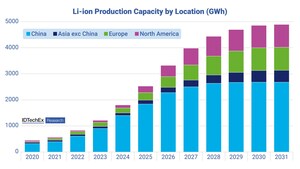
BOSTON, Jan. 6, 2020 /PRNewswire/ -- Recycling waste plastics is essential to creating a circular economy. Current recycling methods are hampered by issues such as societal perceptions of recycling, to economic barriers and technological; however, over the past few years the number of technical innovations to improve polymer recycling have substantially increased. From IDTechEx's latest report, "Green Technology and Polymer Recycling 2020-2030: Technology for a Sustainable Circular Economy in Plastic Waste" by Dr Bryony Core, this article presents the key recycling processes that are helping to address the problem of waste plastic.
Polymer recycling can be categorised as either a physical or chemical process. In a physical process, the polymer is separated from other polymers or impurities using a process that relies on a physical property such as melting point or solubility. Although the polymer may be chemically altered in the process, this is inadvertent, and not the principal route through which the polymer is purified. The established recycling method is secondary mechanical recycling, which relies upon the removal of impurities such as other polymers or non-recyclable contaminants manually or optically, before the polymer is ground down, melted and extruded into pellets.
The downsides of mechanical recycling are that sorting prior to melting is imprecise and prone to impurity inclusion. Although steps have been taken to increase impurity removal with new optical sorting techniques such as near infrared, the primary route to reducing contamination relies upon the individuals producing the waste to sort it correctly into constituent materials at the point of generation. Even if the input polymer is free from contamination, the very act of heating to melt the polymer can impair the properties of the recycled output polymer, as heat can breakdown the polymer backbone for certain polymer types.
These issues, combined with other economic considerations, have acted as barriers to the widespread implementation of recycling; however, innovations in the field of polymer recycling are helping to address the technical hurdles to increasing recycled polymer quality. These new processes tend to fall into three categories: solvent extraction, plastic to fuel conversion or depolymerisation. Solvent extraction is a physical process and relies upon the different solubility of the target polymer to the impurities with which it is comingled. So far, there have been a handful of start-ups in the past few years who have developed this process to recycle common polymers, including waste polyester fabrics.
The two other processes, plastic to fuel conversion and depolymerisation, are both chemical methods of recycling. Chemical recycling relies on the transformation of the waste polymer into chemically different products via a reaction. The more mature technology, plastic to fuel conversion, uses mixed polymer waste which is otherwise very challenging to recycle, and outputs fuel fractions using chemical reactions such as pyrolysis or gasification.
The relative newcomer, depolymerisation, is the reverse of how the polymer is created in the first place: the polymer is thermally or catalytically broken down, either into raw materials that can be used directly to resynthesise the polymer, or into other useful chemical intermediates. Depolymerisation is particularly exciting as it offers a route to access the polymer without any of the downsides experienced in other recycling methods: the resultant polymer has identical properties and it is reasonably tolerant to contaminants.
The need for improved waste management protocols for polymers that have reached the end of their useful life is evident. Although some of the challenges are economic and social, developing new processes to address the technical barriers to increased global rates of polymer recycling will substantially assist in realising a circular economy.
For more information regarding IDTechEx's report "Green Technology and Polymer Recycling 2020-2030: Technology for a Sustainable Circular Economy in Plastic Waste", please visit www.IDTechEx.com/GreenPoly or for further Advanced Materials research available from IDTechEx visit www.IDTechEx.com/Research/AM.
IDTechEx guides your strategic business decisions through its Research, Consultancy and Event products, helping you profit from emerging technologies. For more information on IDTechEx Research and Consultancy contact [email protected] or visit www.IDTechEx.com.
Media Contact:
Jessica Abineri
Marketing Assistant
[email protected]
Tel: +44 (0)122-381-2300
SOURCE IDTechEx








Share this article